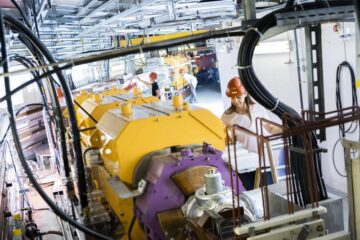Leeds researchers fuelling the ‘hydrogen economy’

Biodiesel – motor fuel derived from vegetable oil – is a renewable alternative to rapidly depleting fossil fuels. It is biodegradable and non-toxic, and production is on the up. But for each molecule of biodiesel produced, another of low-value crude glycerol is generated, and its disposal presents a growing economic and environmental problem.
Now researchers Leeds have shown how glycerol can be converted to produce a hydrogen rich gas. Hydrogen is in great demand for use in fertilisers, chemical plants and food production.
Moreover, hydrogen is itself viewed as a future ‘clean’ replacement for hydrocarbon-based transport fuels, and most countries currently reliant on these fuels are investing heavily in hydrogen development programmes.
The novel process developed by Dr Valerie Dupont and her co-investigators in the University's Faculty of Engineering mixes glycerol with steam at a controlled temperature and pressure, separating the waste product into hydrogen, water and carbon dioxide, with no residues. A special absorbent material filters out the carbon dioxide, which leaves a much purer product.
“Hydrogen has been identified as a key future fuel for low carbon energy systems such as power generation in fuel cells and as a transport fuel. Current production methods are expensive and unsustainable, using either increasingly scarce fossil fuel sources such as natural gas, or other less efficient methods such as water electrolysis.”
“Our process is a clean, renewable alternative to conventional methods. It produces something with high value from a low grade by-product for which there are few economical upgrading mechanisms” says Dr Dupont. “In addition, it’s a near ‘carbon-neutral’ process, since the CO2 generated is not derived from the use of fossil fuels.”
Dr Dupont believes the process is easily scalable to industrial production, and, as the race towards the ‘hydrogen economy’(1) accelerates, could potentially be an economically important, sustainable – and environmentally friendly – way of meeting the growing demand for hydrogen.
Dr Dupont’s research has been funded with a £270k grant from the Engineering and Physical Sciences Research Council (EPSRC) under the Energy programme, and is in collaboration with Professors Yulong Ding and Mojtaba Ghadiri from the Institute of Particle Science and Engineering, and Professor Paul Williams from the Energy and Resources Research Institute at the University. Industrial collaborators are Johnson Matthey and D1-Oils.
Media Contact
More Information:
http://www.leeds.ac.uk/media/index.htmAll latest news from the category: Ecology, The Environment and Conservation
This complex theme deals primarily with interactions between organisms and the environmental factors that impact them, but to a greater extent between individual inanimate environmental factors.
innovations-report offers informative reports and articles on topics such as climate protection, landscape conservation, ecological systems, wildlife and nature parks and ecosystem efficiency and balance.
Newest articles

Inverters with constant full load capability
…enable an increase in the performance of electric drives. Overheating components significantly limit the performance of drivetrains in electric vehicles. Inverters in particular are subject to a high thermal load,…

Combination of heavy ion therapy and mRNA vaccine
Joining forces for cancer research: TRON and GSI/FAIR study combination of heavy ion therapy and mRNA vaccine. It could be a new, promising combination of two therapeutic approaches and a…

Environmental changes influence microbial diversity
Adaptation as a strategy for survival: A new study from Jena University shows how microorganisms deal with environmental changes. Environmental changes influence microbial communities, which are crucial for the health…





















